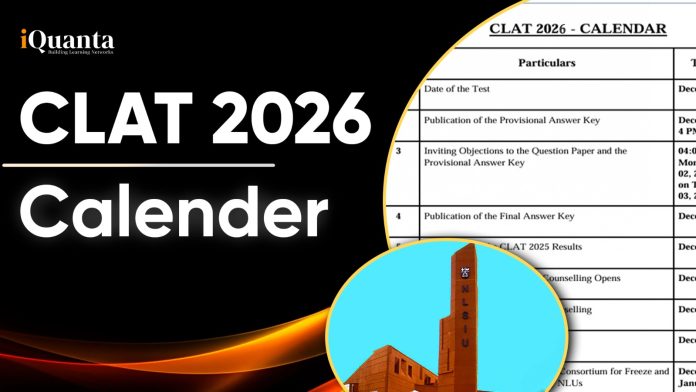The Common Law Admission Test serves as the gateway to some of the most recognized National Law Universities (NLUs) of India. Every aspiring legal candidate in India wants to grab a seat in any of the top National Law Universities. To get into the top NLU’s, one must clear the Common Law Admission test, and to do so, one must be aware of the key dates and insights of the examination. This blog will guide you through the expected dates of the examination, preparation strategies and much more.

CLAT 2026 Important Dates
Candidates must be aware of the important dates related to the CLAT 2026 Examination to apply, register and appear for the examination on time. The detailed information are mentioned below:
| Notification | Dates |
| CLAT 2026 Notification | May 2025 |
| CLAT 2026 Application Start Date | June 2025 |
| CLAT 2026 Last date to fill application | October 2025 |
| CLAT 2026 Application Correction | October 2025 |
| CLAT 2026 Admit Card Release Date | November 2025 |
| CLAT 2026 Examination Day | 06 December 2025 |
| CLAT 2026 Answer Key Release date | To be notified |
| CLAT 2026 Final Answer Key | To be notified |
| CLAT Results release date | To be notified |
CLAT 2026 Key Details
There are multiple key aspects that a candidate must be aware of before appearing for CLAT 2026 which includes the mode of examination, examination pattern, syllabus and much more. All these key details are mentioned in the table given below:
| Key Feature | Details |
| Examination Conducting Body | Consortium of National Law Universities |
| Conduction Frequency | Only once a year |
| CLAT 2026 Examination Date | 06 December |
| Typology of Questions | MCQ-Based |
| Level of Examination | National Level Examination (Moderate-Tough) |
| Purpose of Examination | To offer seats to candidates in participating NLU’s and Private Law Colleges |
| Application Fee | 4000/- General/OBC 3500/- Other Reserved Categories |
| Mode of Examination | Offline/Pen-Paper Mode |
| Duration of Examination | 2 hours |
| Question Paper Language | English |
| Total Seats available | 3000 seats for UG Program 1000 seats for PG Program |
| Official Website | Consortiumofnlus.ac.in |

Eligibility Criteria for CLAT 2026
The Common Law Admission Test 2026 is also expected to have similar eligibility criteria as last year. Given below is an outline for the eligibility criteria for both UnderGraduate as well as PostGraduate candidates:
Undergraduate Candidates:
| Factors Involved | Details |
| Qualifications | Appearing candidates must have passed their 10+2 examination from any of the recognised boards. General Category candidates must secure at least 45% and SC/ST candidates must secure at least 40% marks in the qualifying examination. |
| Upper Age Limit | There is no upper age limit for the examination, although the minimum requirement for the candidates is to clear the 10+2 or any equivalent examination. |
| Candidates | Candidates appearing for their final year examination of 10+2 examination can also apply for the examination. |
Postgraduate Candidates:
| Factors Involved | Details |
| Qualifications | Candidates must have pursued an LLB Degree or any equivalent degree from a recognised university. |
| Upper Age Limit | There is no upper age limit for the candidates wishing to apply for the examination. |

Document Requirements for Application Form for CLAT 2026
Every candidate must know the list of documents required for filling out the application form. The list of documents required for both undergraduate as well as post graduate examination is given below:
Undergraduate Candidates:
- Class 10th Marksheet
- Class 12th Marksheet
- Passport-sized photograph
- Scanned copy of signature
- Category Certificate (If applicable)
- Domicile Certificate (If applicable)
Postgraduate Candidates:
- LLB/ Equivalent Degree Marksheet
- Passport-sized Photograph
- Signature
- Category Certificate (If applicable)
- Domicile Certificate (If applicable)
- General Documents as per the guidelines by the Consortium of NLU’s
- Valid ID Proof
- PwD Certificate (If applicable)
Also Read: CLAT Mock Test
CLAT 2026 Preparation Strategies
Clearing the Common Law Admission Test requires you to have an effective strategy to learn time-management and other skills required for the examination. Given below are some preparation strategies that will help you ace the examination:
- Start early: Begin your preparation as early as possible, this will definitely give you an edge in the examination. You will have enough time to analyse and understand the examination first and then plan your preparation accordingly.
- Develop a daily reading habit: Develop the habit of reading daily newspapers and editorial to enhance your reading skills and keep yourself updated with the current national and international affairs. Familiarize yourself with the legal terms to avoid getting stuck in the examination.
- Mock tests: Regularly appear for mock tests to assess yourself regularly on the topics that you have read and prepared. Analyse your performance to identify your weak areas and work on them accordingly. Solve the previous years question papers to understand the examination pattern.
- Maintaining Consistency: Create a followable study plan and try sticking to it. Allocate sufficient time for every section to avoid missing out on any important topic. At last maintain a positive attitude and have faith in yourself, this will definitely help you in the long run.

FAQs
The official notification for the CLAT Examination will be released on the official website of the consortium of NLUs. The exact dates will be also released on the official website itself.
Candidates must prepare strategically to score the maximum marks in the examination. They can do so by starting early, practising regularly and focusing on current affairs primarily.
Based upon the previous trends the Common Law Admission Test 2026 is expected to be held in December 2025 or January 2026. The exact notifications will be released by the consortium of NLUs real soon.
The counselling process for the Common Law Admission Test remains the same for this year too. Candidates will register online followed by filling up their NLU preferences, document verification and seat allotment process.
The CLAT 2026 merit list will be entirely based upon the scores and ranks of the candidates appearing for it. Candidates achieving higher scores will be ranked at the top.




